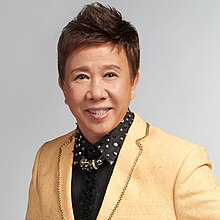This article has multiple issues. Please help improve it or discuss these issues on the talk page. (Learn how and when to remove these messages)
|
| Wan Kwong | |||||||||||
|---|---|---|---|---|---|---|---|---|---|---|---|
 Wan Kwong's official portrait by the WSM Entertainment Limited Wan Kwong's official portrait by the WSM Entertainment Limited | |||||||||||
| Born | (1944-08-23) August 23, 1944 (age 80) Cholon, Saigon, French Indochina | ||||||||||
| Occupation(s) | Cantonese opera singer, actor | ||||||||||
| Years active | 1960s – present | ||||||||||
| Chinese name | |||||||||||
| Chinese | 尹光 | ||||||||||
| |||||||||||
Jackson Wan Kwong (Chinese: 尹光), born Lữ Minh Quang (Chinese: 呂明光), is a singer from Hong Kong, nicknamed "the Temple Street Prince."
Wan was born in Cholon, Saigon in 1949 to a Cantonese Vietnamese family and was trained as a Cantonese opera singer. Wan left South Vietnam for British Hong Kong with his family as the Vietnam War heated up. From the 1960s to the 1980s, he switched to pop songs, whose lyrics, often in vulgar language, reflected the lives of the Hong Kong working class. Around the 1990s, he collaborated with other senior singers in Hong Kong, singing in pubs and on TV shows. He released an album called Ignoring Father (少理阿爸) in 2002 and still holds concerts occasionally.
Discography
- Hollywood Grand Hotel (荷里活大酒店)
- Counting Hair (數毛毛)
- The Fortune Teller Tai Tset Sai (相士大隻西)
- Ignoring Father (少理阿爸)
- Chasing the Dragon (追龍)
External links
- June Ng (4 September 2008). "Cult Icon Singer Wan Kwong". HK Asia-City. Archived from the original on 7 July 2011. Retrieved 28 December 2010.
References
- "How ties developed between Hong Kong and South Vietnam EJINSIGHT - ejinsight.com". Hong Kong Economic Journal. Retrieved 23 April 2021.
This biographical article about a Hong Kong singer is a stub. You can help Misplaced Pages by expanding it. |